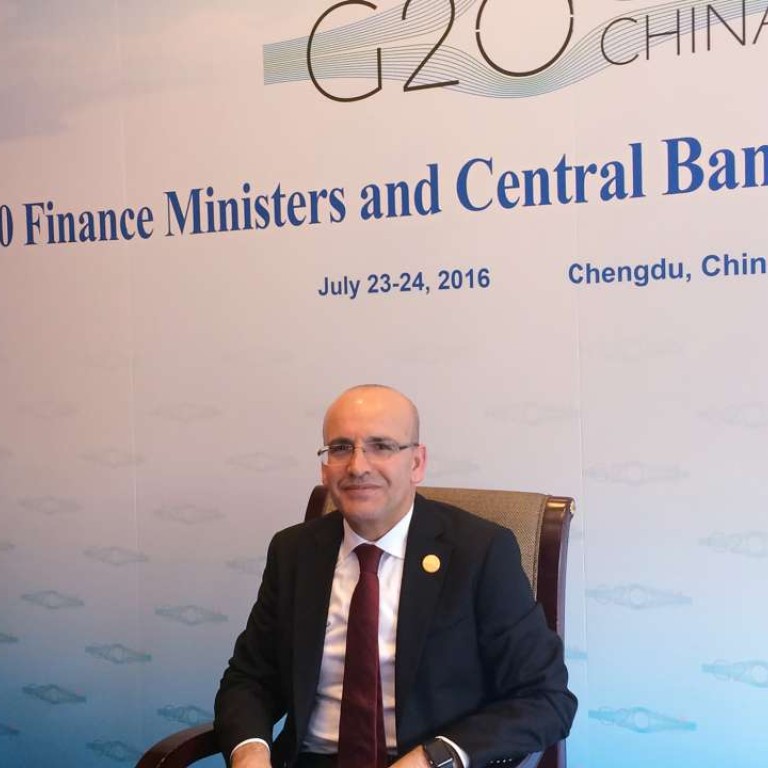
Limited economic fallout from failed coup, says Turkish deputy PM
Mehmet Simsek defends clampdown in wake of attempted government overthrow
Any economic fallout from the failed coup in Turkey this month would be “short-lived and insignificant”, the country’s deputy prime minister in charge of economic policy said on the weekend on the sidelines of the G20 finance chiefs meeting in Chengdu.
Despite concerns from the European Union about a sweeping clampdown on tens of thousands of alleged Turkish coup plotters and participants, Mehmet Simsek said the move was necessary to “honour democracy” and “mitigate risks”.
The international community should stand by the Turkish people, and therefore, their legitimate government
“The international community should stand by the Turkish people, and therefore, their legitimate government,” he said.
Ahead of the release of the Chengdu gathering’s final communiqué, Simsek said Turkey would “certainly encourage” the G20 meeting to endorse Ankara’s stand on the coup in the statement. “We would like [the world] to unequivocally condemn a vicious military coup first, without ‘ifs’ and ‘buts’,” he said. But Turkey would not “make a big fuss” if all G20 members could not agree with Ankara’s stand.
However, there was no reference to the coup in the communiqué released on Sunday afternoon.
US Treasury Secretary Jack Lew said Washington supported the “democratically elected” government in Turkey, but investigations should respect the rule of law.
More than 8,000 members of the judiciary, military, police and civil service had been arrested and nearly 3,300 others detained in the aftermath of the July 15 coup attempt, state-run Anadolu Agency reported, and at least 15,000 teachers could be stripped of their teaching licences.
Amnesty International described the Turkish authorities’ actions as “a crackdown of exceptional proportions”.
But Simsek said none of the arrests was based on an “emotional outburst or vengeance”.
He said Turkey remained a “rule-of-law country” and “democratic institutions continue to function” amid the state of emergency declared by President Recep Tayyip Erdogan.
Simsek said the criticism against Turkey’s state of emergency was a matter of “perception” and “credibility”, given similar declarations by France after the terrorist attacks in Paris and Nice.
“When Turkey does it [declare a state of emergency], everybody is saying that ‘oh, let’s be careful’,” Simsek said, adding that it appeared more acceptable when France did the same.
On the economic front, Simsek said Turkey, which held the G20 presidency last year, might fall a little short of the country’s original growth target of 4.5 per cent this year. “Now maybe the growth is going to be somewhat weaker,” he said. “Instead of 4.5 per cent, maybe it’s going to be 4 per cent … but still no big deal.”
He also acknowledged diplomatic tensions between Turkey and China. In a move that angered Beijing, Turkey firstly accepted and then rejected a US$3.4 billion long-range air and anti-missile defence system deal with China last year.
We understand China was kind of frustrated with us. We explained that we’ve been trying hard to get back after the deal failed
Simsek said Turkey “sincerely desired to work with China” when it invited bidders from China, Russia and France to supply the system and found China’s offer the most preferred.
However, Ankara was later warned that the system would not be compatible with Nato’s arrangements and as a member of Nato, Turkey had to reject its Chinese supplier, Simsek said.
“We understand China was kind of frustrated with us. We explained that we’ve been trying hard to get back after the deal failed. We believe in stronger cooperation with China in trade and investment,” he said.
Another issue standing in the way of closer ties between Beijing and Ankara is the Uygurs, a Muslim ethic minority in China’s northwestern Xinjiang region who share ancestral, linguistic and cultural links with groups in Turkey. Beijing has accused Turkey of giving shelter to some Uygurs involved in separatist and terrorist activities against China.
Bangkok sends 8 Uygurs to Turkey after criticism for deporting more than 100 refugees to China
Simsek said Turkey would not allow any threat against China from Turkey. “There is no good or bad terrorism … Terrorism is the enemy of humanity. It does not matter [about] ethnic or religious background, or geographic location. We have made it clear to our Chinese friends we will continue to work together [on counterterrorism],” he said.
But Simsek suggested that Beijing and Ankara might not always agree on the issue, saying investigations “require process and evidence”. He said China was applying a very restrictive visa regime to Turkish people by requiring an official invitation instead of a normal business invitation. “It is not in the interest of China …Turkish people should be able to come here to do business,” he said.


